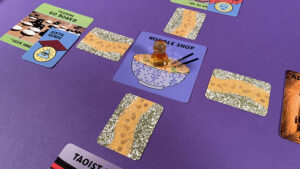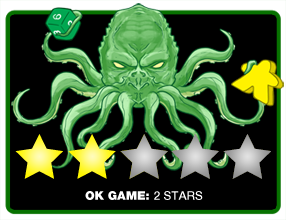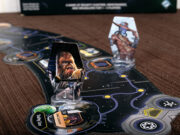 I’m a spiritual person so when we were provided the opportunity to look at this game I immediately knew this was meant for me. The pitch mentioned enlightenment and a journey so that’s all it took for me to want to look into it. It wasn’t until later that I found out “snatching the pebble from one’s hand” is actually an idiom (often from kung fu) meaning to “fully grasp the meaning of a concept”, not just some mechanic of the game.
I’m a spiritual person so when we were provided the opportunity to look at this game I immediately knew this was meant for me. The pitch mentioned enlightenment and a journey so that’s all it took for me to want to look into it. It wasn’t until later that I found out “snatching the pebble from one’s hand” is actually an idiom (often from kung fu) meaning to “fully grasp the meaning of a concept”, not just some mechanic of the game.
Snatch the Pebble is a casual card game for 1-2 players that takes about 60 minutes to play. The best experience is solo to reduce game time and prevent unnecessary discussion.
Gameplay Overview:
After preparing the Paths deck, Clearings deck, Obstacles deck, Void, and Pack, you also set out the Noodle Shop in the center of the playing area to begin your journey. Your character is designated by a small orange avatar meeple.

The game takes place over several turns until the end game is triggered. Each turn consists of six phases: Explore Phase, Obstacle Phase, Power Phase, Move Phase, Restore Phase, and Pack Phase. The goal of the game is to reach enlightenment by visiting four masters and snatching the pebble from each of their hands. Pebbles are then taken to their home temple to receive insight (lightning bolt tokens in game), and all four insights will lead to enlightenment. It is possible to be stuck on the path there, in which case the quest fails.
Throughout the game you are having to overcome obstacles by either going around them or using skills or scrolls acquired during the game to get through them, sometimes taking advantage of resources like Karma or Qi. Just like in real life, you can only choose the direction that you travel and you don’t necessarily have full control over what lies ahead. Some paths to a master can be short, others longer and more winding.
If you find yourself at a point on the path where you cannot make progress from a clearing, the game will end and it is considered a loss unless you manage to deliver all four pebbles to the temples before that happens. Belts are awarded at the end of the game based on the number of pebbles and lightning bolts in your Pack.

Game Experience:
Before I explain my experience I will disclose that I played on easy difficulty level just to get a hang of the game and what would be expected of me.
My biggest and only problem with this game was the rulebook. I found that there were not enough reference photos for paths, so players must make assumptions based on descriptors and emboldened words skimming through it. Other than that, I found the game to be quite enjoyable through its oftentimes profound mechanics.

The treatment of obstacles was interesting in that you cannot eliminate them, only overcome them. It’s something I hadn’t thought about, mostly because I am so used to other games allowing you to fully eliminate enemies or obstacles in ways that they were guaranteed to not bother you again. There were a number of times I had to go through the same path again or when the Obstacles deck totally hosed me being able to take a straightforward path to an objective. The downside to trying to just circumnavigate obstacles in the game is that the path continues to grow past what is feasible and turns can take quite a few more steps than is ideal. Yet everything is the luck of the draw, and sometimes you are forced to take more than one route just to find Alchemy Library cards with scrolls or Training cards with skills to overcome obstacles in the way of masters or temples.
The positive news regarding Obstacles is Good Karma can be acquired at a specific clearing called the Well & Woodpile, and can be used later to ignore any one Obstacle card. This game had a fun thematic use of it “coming around” in this sense since the Obstacle card is simply paused and not removed. Another Obstacle card called “Shuffle Up” will balance the scales with Bad Karma and bring in the paused Obstacle to take effect immediately. So like all the other inconvenient events in this game, these things don’t fully go away.

I find the game’s view of resources or good things happening always comes with a cost, like having Qi in your pack can burn a hole in it but will restore a skill that was previously used. Inventory management is a nightmare in this game when trying to carry both pebbles and lightning bolts so losing a spot due to Qi is a tragedy. I suppose that’s really the philosophy of everything behind this game is that balance is key, and that there is always a cost related to all things. That somehow it’s impossible to withdraw infinitely without a deposit and what you are faced with will always follow a conservation law, no matter how convenient or beneficial to you at the time. Really deep stuff!
Anyone starting to play this game should know that it’s less stressful and much nicer to not have hope when trying to achieve a thing or get something. Surprising how similar it is to what I at least try to do in my own life, which is do my best and control what I can but let the rest of it happen as it will and not get too hung up on the results.

Strangely this game is much easier solo even though you can play with one other person, which is a possible commentary on our interactions with others in general. If you’re on the path to enlightenment, surely it’s more straightforward and consistent to listen to your own opinions and focus on what the journey is for you as an individual rather than relying partially on the opinions of others.
Despite the glowing game experience and insightful mechanics, I hate to say it but I would not want to try this at higher difficulty levels just to replay the game and I would not replay this game at the easy difficulty level I already “won” with. I’m never one to justify playing a game simply to challenge myself or to see if I do better at it. By my standards — which not everyone can agree with and that’s valid — the game itself needs to be replayable in its own right because it’s a fun game. I got what I expected and wanted out of my first play but cannot imagine that I will get a wildly different experience or rewarding journey playing it again, so I had to factor that into my final thoughts and final score.
Final Thoughts:
This game is for anyone looking for a casual adventure with a spiritual feel. Since most everything is random and out of your control it’s difficult to overthink it if you just don’t have the brain power at the time. However, if you don’t have a lot of table space to spare this game would not be a good addition to your collection simply because of how much of a table hog it can be should your path to enlightenment be long. Unless you enjoy the challenge of having to conquer every difficulty level a game has, Snatch the Pebble also has very little replayability that is worth the variable time investment.
Final Score: 2 Stars – Follow your own path to enlightenment in this casual card game that takes from elements of kung fu and other spiritual practices.
 Hits:
Hits:
• Profound concepts packaged in game form
• Small box but big adventure
• Immersive but accessible puzzles
Misses:
• Bad luck requires repeat sessions
• Some game resources create false hope
• Important information buried in rules






















